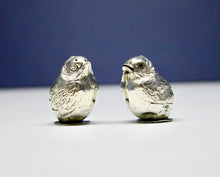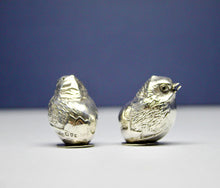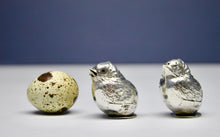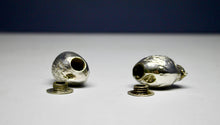A rare pair of Sterling Silver 'Hatching Chicks' by Sampson Mordan for Mappin & Webb.
Modelled in the form of Chicks emerging from an egg. The bases unscrew to allow filling. The pepper has holes on the top, the salt is designed to pour thru the beak.
Both the base and body fully hallmarked Chester 1907.
The base engraved 'Mappin & Webb'
RD No. 4161360.
Height : 4cm
Sampson Mordan (1790-1843) was an English silversmith who co-invented the first patented mechanical pencil. Under the guidence of his sons, the company prospered mainly peoducing novelity pencils, vesta cases, card cases, condinment pieces etc.
They where represented at the London Great Exhibition in 1851 and at the 1922 and 1929 British Industries Fairs. They supplied retailers such as Mappin & Webb,Asprey & Sons and The Gold & Silversmiths Company.
Their factory was distoryed by bombing during the second world war and went into liquidation in 1952.








